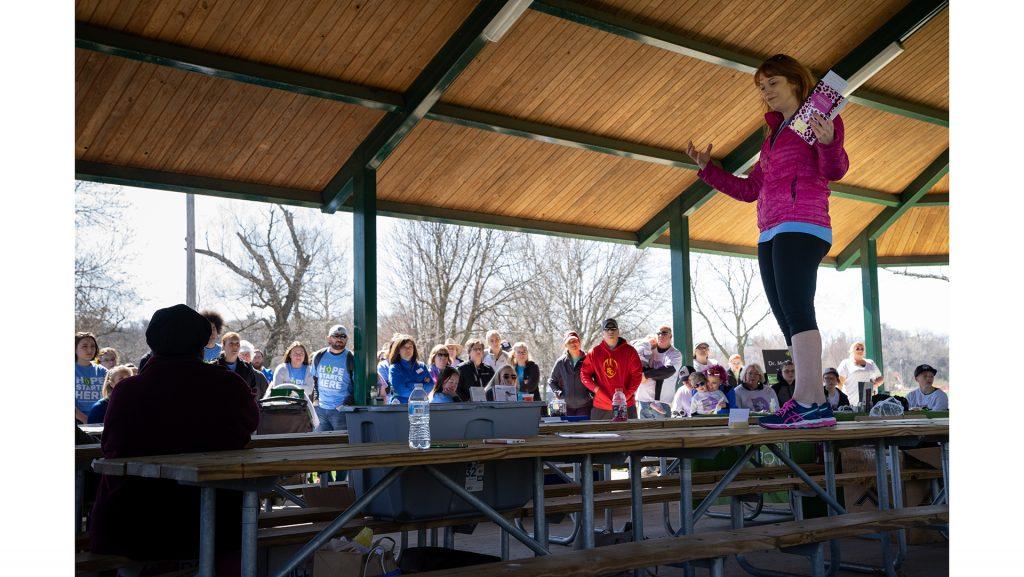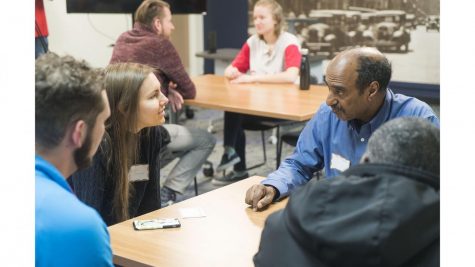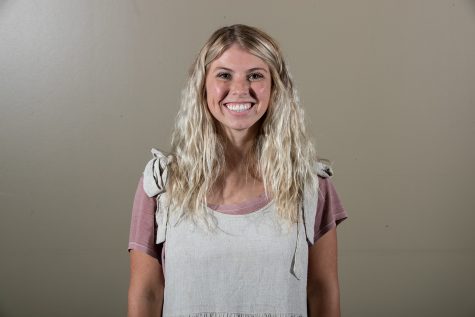Newby: Eating disorders prevail on college-campuses
The prevalence of eating disorders among college students continues to span statistics as well as generations, and people grappling with them deserve unwavering support and attention.
Jennifer O’Toole speaks during a National Eating Disorders Awareness event in City Park on Saturday, April 29, 2018. O’Toole overcame anorexia and is now a renowned author and public speaker. (Matthew Finley/The Daily Iowan)
April 4, 2019
It was two months into freshman year when my eating disorder beckoned as a place of familiarity amid the anxiety that overwhelmed me, and I relapsed. And it was my community members who fought alongside me to bring me out of my battle the minute I sat down with them and shared my struggle.
The minute I revealed the reality of my ache, they responded out of love with immeasurable compassion — a quickness to seek to understand and meet me with support.
As they sat there with me — in the middle of the night, holding my hand and asking questions — they encouraged me with every ounce of grace they could muster that it was OK to ask for help. It was OK to need help.
Eating disorders are gripping, grief-ridden, and overwhelming. And often, overlooked. As the number of people grappling with binge-eating, anorexia nervosa, or bulimia increases, awareness needs to be right along with it.
RELATED: Lawmakers try to expand CBD program
According to the National Eating Disorders Association, at least 30 million people of all ages across the United States wrestle with an eating disorder of some form. And of any mental illness, eating disorders have the highest mortality rate.
For Iowa, that number sits somewhere around 90,000 for people who wrestle with an eating disorder. And the battle is unshakably difficult, deserving unrelenting and unwavering support amid the community, especially on a college campus.
The prevalence of this issue among college students continues to span statistics as well as generations. According to a study done by The Guardian, the number of people being admitted to hospitals with life-threatening eating disorders has nearly doubled in the last seven years.
According to the National Eating Disorder Association, “the best-known environmental contributor to the development of eating disorders is the sociocultural idealization of thinness.”
RELATED: Community walk recognizes the connection between autism and anorexia
And a National Institute of Mental Health study of more than 2,400 people who have been hospitalized for eating disorders found that 97 percent of individuals had one or more co-occuring conditions. Among the conditions, 94 percent had co-occurring mood disorders — mostly being major depression.
Outside of depression, disorders such as anxiety, obsessive-compulsive disorder, post-traumatic stress disorder, or even an alcohol or substance-abuse disorder prevail alongside eating disorders.
Accessibility to treatment services is detrimental to a person’s healing journey — encompassing both eating disorders and other areas of mental illness.
The University of Iowa Hospital Clinics serves as one of the only inpatient or partial hospitalization eating-disorder-treatment programs in the state — offering itself as a place of refuge for those seeking help in any way, to any degree.
While treatment within reach is revolutionary to someone’s healing journey, the effectiveness of a supportive and understanding community can be enough to carry anyone forward.
That may look like familiarizing ourselves with the flashes of warning that give way to the heart-wrenching pain that pushes its way through our peers’ lives — or paying attention to the people waving white flags, and offering them a hand, an ear, a place to process.
There is no pressure to be a professional caregiver to someone who is suffering. There is only the power of showing up and serving as a safe place — someone for a person to walk with in the direction of resources that will refine and reshape the course of the healing journey.
Resources are near, and it’s OK to need help. Don’t hesitate to reach out the the UI Hospitals & Clinics, the UI Counseling Service, or the national helpline at 1-800-662-4357.





















